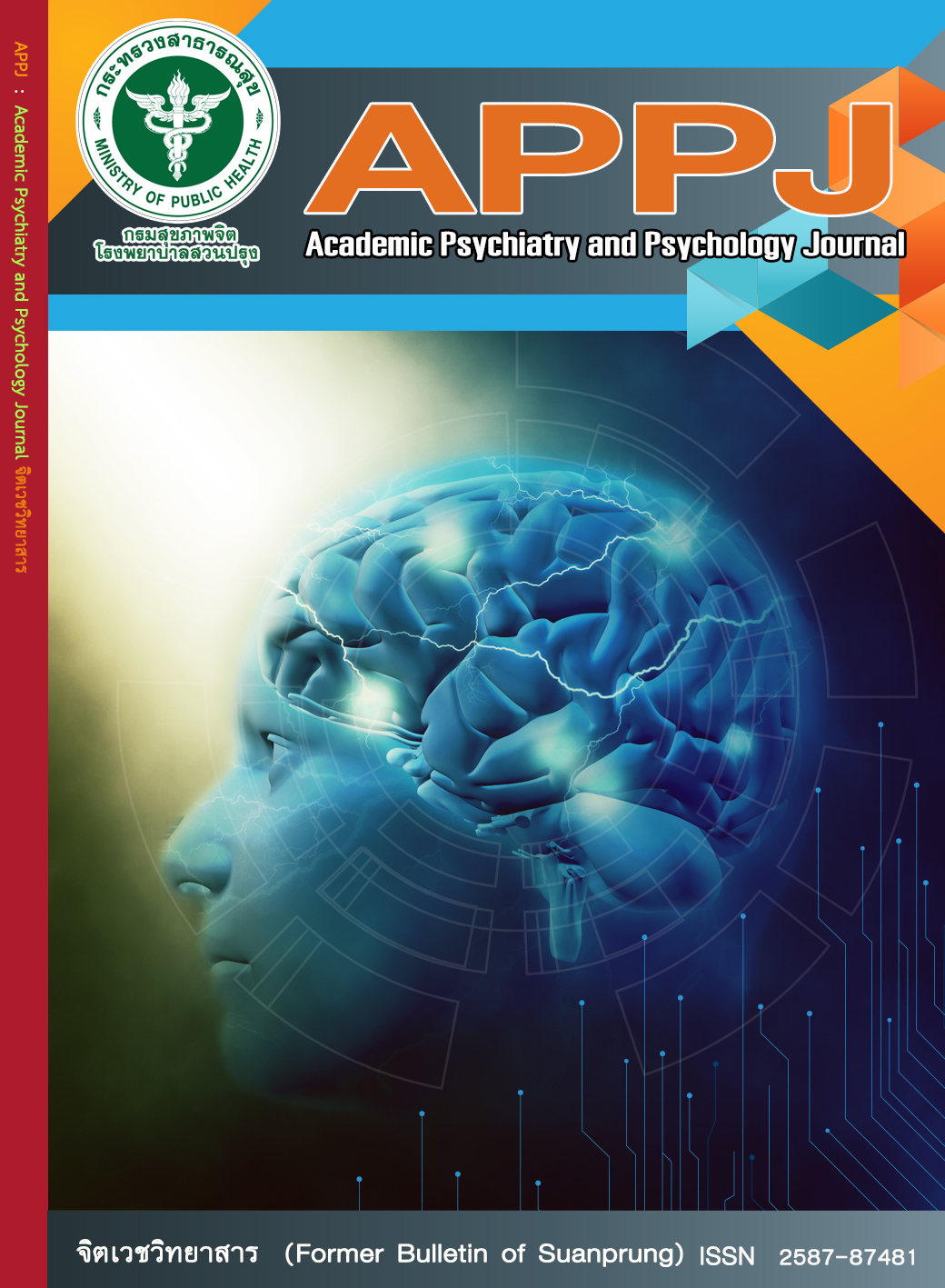Clinical psychology: Professional roles, competence, and criteria
Main Article Content
Abstract
Preamble: This review article is a part of a survey research “Competencies and Self Development of Thai Clinical Psychologists”, which was financially supported by Saint Louis College in 2016. The research was conducted with the aims for developing effective academic programs and trainings for clinical psychology students, and also Thai clinical psychologists willing to improve their knowledge and skills. The researcher believed that defining the professional roles alone was not able to guide students and clinical psychologists’ on how to improve their competencies. Thus the information gathered from the literature review would be discussed in this article for the use of Thai clinical psychologists, academic settings, and professional organizations.
Content: The search targeted professional agencies in the United States of America, United Kingdom, and Australia, where their professional and academic quality are highly accepted worldwide. The searching focused on 1) professional roles and responsibilities of clinical psychologists 2) standard criteria to become a clinical psychologist and 3) criteria and levels of competence. The obtained information was compared with the Thai context.
Conclusions: All the great nations valued every single professional steps - including the specification for each degree in clinical psychology together with prerequisite knowledge and course work, a curriculum with years of practice opportunity, clinical experiences after graduation, requirements for professional licensing, and continuing education through-out professional life as a clinical psychologist.
Article Details
บทความหลังผ่านการปรับแก้จากกองบรรณาธิการแล้ว เป็นลิขสิทธ์ของวารสารจิตเวชวิทยาสาร โรงพยาบาลสวนปรุง กรมสุขภาพจิต กระทรวงสาธารณสุข ห้ามเผยแพร่เพื่อประโยชน์ทางการค้าโดยไม่ได้รับอนุญาต แต่อนุญาตให้เผยแพร่บทความดังกล่าวเพื่อประโยชน์ทางการศึกษาแก่ประชาชนทั่วไป ทั้งนี้กองบรรณาธิการไม่จำเป็นต้องเห็นด้วยกับบทความหรือข้อคิดเห็นใดๆ ที่ปรากฏในวารสารสวนปรุง
References
2. American Psychological Association. Guidelines on multicultural education, training, research, practice, and organizational change for psychologists. American Psychologist 2002;58(5):377-402.
3. American Psychological Association. Revised Competency Benchmarks for Professional Psychology. Washington D.C.: APA; 2011.
4. American Psychological Association. A Practical Guidebook for the Competency Benchmarks. Washington D.C.: APA; 2012.
5. The American Board of Professional Psychology. Clinical Psychology Competencies [Internet]. [2016 May 1]. Available from: https://www.abpp.org/i4a/pages/index.cfm?pageid=3307
6. The British Psychological Society’s Committee for Scrutiny of Individual Clinical Qualifications. Core Competencies – Clinical Psychology – A Guide. Leicester, UK: BPS; 2006.
7. The British Psychological Society’s Division of Clinical Psychology. (2010). The core purpose and philosophy of the profession [Internet]. 2010 [cited 2016 May 1]. Available from: https://www1.bps.org.uk/system/files/Public%20files/DCP/cat-713.pdf
8. Australian Psychological Society. Clinical Psychology [Internet]. 2016 [cited 2016 May 1]. Available from: www.psychology.org.au/public/clinical/
9. Nakorn Srisukho, Pimpaporn Sungrassamee, Jintana Singkhonard. Licensure in clinical psychology. Journal of Clinical Psychology 2012;43(2):1-5.
10. Bureau of Sanatorium and Art of Healing. Professional Standards for the Art of Healing in Clinical Psychology 2009. 2nd ed. Bangkok: Bureau of Sanatorium and Art of Healing; 2013.
11. Huey DA, Britton PG. A portrait of clinical psychology. Journal of Interprofessional Care 2002;16(1):69-78.
12. American Psychological Association. Guidelines and Principles for Accreditation of Programs in Professional Psychology [Internet]. 2013 [cited 2016 May 1]. Available from: https://www.apa.org/about/policy/accreditation-archived.pdf
13. Association of State and Provincial Psychology Boards, the United States of America. Jurisdictional Handbook [Internet]. 2012 [cited 2016 May 1]. Available from www.asppb.org
14. Rodolfa E. Basic steps to licensing. In: Dittmann M. What you need to know to get licensed: Experts offer a lesion on how to become a licensed psychologist [Internet]. 2004 [cited 2016 May 1]. Available from https://www.apa.org/gradpsych/2004/01/get-licensed.aspx
15. Profession Commission in the branch of Clinical Psychology. Profession Commission’s Resolution: Clinical psychology licensing application and examination year 2016. Bangkok: Profession Commission in the branch of Clinical Psychology; 2016.
16. Profession Commission in the branch of Clinical Psychology. Professional Standards for the Art of Healing in Clinical Psychology 2009. 5th ed. Bangkok: Bureau of Sanatorium and Art of Healing, Department of Health Service Support, Ministry of Public Health; 2017.
17. Department of Mental Health, Ministry of Public Health. Department of Mental Health’s competency criteria: definition, indicator, list, level of competencies in practical outcome management system. Bangkok: DMH; 2011.
18. Suwat Mahatnirunkul. editor. Guidelines for quality enhancement in mental health and psychiatry service systems for general hospital, provincial hospital, community hospital, and sub-district health promoting hospital. Bangkok: Department of Mental Health. 2012.
19. Songsom Phungpong, Sunisa Kintarak. 2010 American Psychological Association’s ethical principles of psychologists and code of conduct 2002 with the 2010 amendments. Bangkok: Thai Clinical Psychologist Association; 2015.
20. Wheeler S, Cushway D. Supervision and clinical psychology: History and development. In: Fleming I, Steen L, editors. Supervision and clinical psychology: Theory, practice and perspectives. East Sussex: Brunner-Routledge; 2004. P.11-22.

